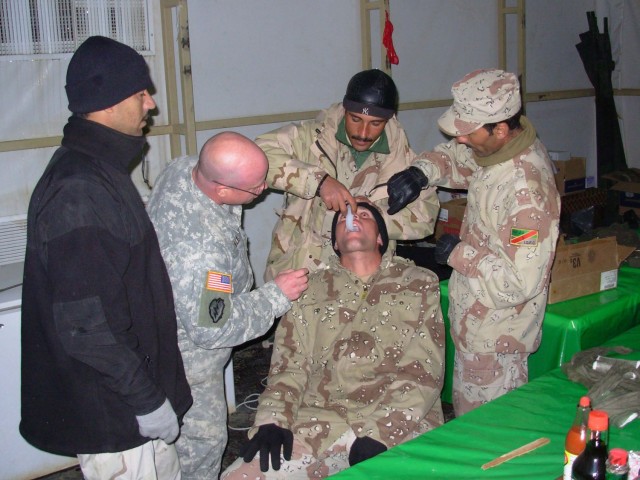COP NIMUR - Troops from 3rd Squadron, 4th Cavalry Regiment, attached to the 4th Brigade Combat Team, 1st Cavalry Division, spent four days training Iraqi security forces in first aid, and provided them with some advanced medical techniques at Combat Outpost Nimur.
The class consisted of 28 Iraqi Army soldiers, four Sinjar area Iraqi police and five Iraqi border policemen.
One of the instructors of the course was Sgt. Richard Kyle, combat medic, Headquarters and Headquarters Troop, 3-4 Cavalry, a unit based out of Schofield Barracks, Hawaii. "We were teaching them the Combat Lifesaver course," he explained. "This was an initial introduction to first aid for them. Most of them have never experienced any of this, so they were pretty excited to learn."
Kyle said they organized the course so that basic instruction would be given in the morning and that they would break into smaller groups for hands-on, practical exercises in the afternoons.
"After each block of instruction, I had my group pair up, then they were given scenarios and tasks they had to practice on each other. I walked them through exercises, like splinting a fracture, and let them try it on each other. When they did it correctly, they would switch roles and do it again. If they didn't do it correctly, I would make sure they understood what they did wrong, then they would get to do it again."
Some of the classes taught were treating abdominal, head and chest injuries, splinting fractures, applying pressure dressings and tourniquets, how to stop a patient's bleeding, treating for shock, and airway management, he said.
For the airway management class, Kyle said, they first taught the group how to check for a pulse. "Some of the students had never known how to check for a pulse," said Kyle. "They were all anxious to learn."
Once they learned about checking for a pulse and were taught the head-tilt, chin-lift method of opening an airway to restore breathing, Kyle said the students were shown how to insert a J-tube into an unconscious patient. The J-tube can be inserted into a trauma victim and left temporarily unattended so care can be given to a more critical patient, Kyle said, which is one of the reasons why it is important to learn. "American Soldiers normally don't want to practice with the J-tube because it is inserted into the throat to keep the airway open which causes a gag reflex," said Kyle. "Some of the Iraqi students wanted to try it. It's not dangerous, just uncomfortable, so we let them practice on each other."
At the end of the course, each student was issued a certificate of completion, written in both English and Arabic, and signed by the squadron commander.
Kyle said teaching this course was something the B Troop commander, Capt. Samuel Benson, wanted to do for the Iraqi security forces. "He wanted to set something up," said Kyle. "It was a collaborative effort with the [military training team] to put this together."
The 3-4 Cavalry medics will next be in the process of training the ISF medics to teach this course. Kyle said his unit plans to teach this course again around Jan. 22 with the Iraqis in the lead. "We will help them teach the course, but mostly it will be them. The goal is for them to one day be able to teach CLS on their own."
Another Coalition Forces Soldier, who assisted in the class, said he knows the training the ISF received was invaluable.
"The Iraqi Forces were eager and willing to learn," said Spc. Lucas Oppelt, combat medic and South Bend, Indiana, native. "With the integration of combat life-saving skills into their training, they will be confident in each other's abilities to save lives on the front line."
Kyle agreed with Oppelt and said he enjoyed spending time with the Iraqis. "I had a really good time teaching them. They asked a lot of questions, were attentive and excited to be learning something new. With these new life-saving skills that the Iraqi Army soldiers are starting to acquire, they will be better suited to help save their fellow soldiers in combat. I'm glad to have been a part of that."


Social Sharing